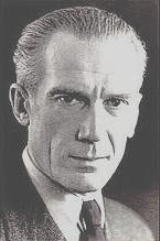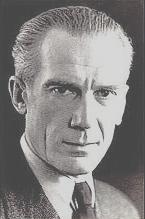
Leo Borchard
Encyclopedia

Russia
Russia or , officially known as both Russia and the Russian Federation , is a country in northern Eurasia. It is a federal semi-presidential republic, comprising 83 federal subjects...
n conductor
Conducting
Conducting is the art of directing a musical performance by way of visible gestures. The primary duties of the conductor are to unify performers, set the tempo, execute clear preparations and beats, and to listen critically and shape the sound of the ensemble...
and briefly musical director of the Berlin Philharmonic.
He was born in Moscow to German parents, and grew up in Saint Petersburg
Saint Petersburg
Saint Petersburg is a city and a federal subject of Russia located on the Neva River at the head of the Gulf of Finland on the Baltic Sea...
where he received a solid musical education, as well being a regular visitor to the Stanislavsky theatre. In 1920, after the Russian Revolution
Russian Revolution of 1917
The Russian Revolution is the collective term for a series of revolutions in Russia in 1917, which destroyed the Tsarist autocracy and led to the creation of the Soviet Union. The Tsar was deposed and replaced by a provisional government in the first revolution of February 1917...
, he emigrated to Germany
Germany
Germany , officially the Federal Republic of Germany , is a federal parliamentary republic in Europe. The country consists of 16 states while the capital and largest city is Berlin. Germany covers an area of 357,021 km2 and has a largely temperate seasonal climate...
. Otto Klemperer
Otto Klemperer
Otto Klemperer was a German conductor and composer. He is widely regarded as one of the leading conductors of the 20th century.-Biography:Otto Klemperer was born in Breslau, Silesia Province, then in Germany...
engaged him as his assistant at the Kroll Opera in Berlin (Klemperer, lacking confidence in his own abilities, expected Borchard to critique his conducting technique). He conducted the Berlin Philharmonic for the first time in January 1933. In 1935, he was banned by the Nazi
Nazism
Nazism, the common short form name of National Socialism was the ideology and practice of the Nazi Party and of Nazi Germany...
regime as politically unreliable. He continued teaching at his apartment and received his friends including Boris Blacher and Gottfried von Einem.
During World War II
World War II
World War II, or the Second World War , was a global conflict lasting from 1939 to 1945, involving most of the world's nations—including all of the great powers—eventually forming two opposing military alliances: the Allies and the Axis...
he was a Resistance activist, (name: Andrik Krassnow), remaining in Berlin, during which time his duties included contact with Ludwig Lichtwitz, a specialist in false identity papers. On 26 May 1945, two and a half weeks after Germany's unconditional surrender
Unconditional surrender
Unconditional surrender is a surrender without conditions, in which no guarantees are given to the surrendering party. In modern times unconditional surrenders most often include guarantees provided by international law. Announcing that only unconditional surrender is acceptable puts psychological...
, he conducted the Berlin Philharmonic in a concert featuring the Overture to Mendelssohn's Midsummer Night's Dream, Mozart's Violin Concerto in A major and Tchaikovsky
Pyotr Ilyich Tchaikovsky
Pyotr Ilyich Tchaikovsky Pyotr Ilyich Tchaikovsky Pyotr Ilyich Tchaikovsky (Russian: Пётр Ильи́ч Чайко́вский ; often "Peter Ilich Tchaikovsky" in English. His names are also transliterated "Piotr" or "Petr"; "Ilitsch", "Il'ich" or "Illyich"; and "Tschaikowski", "Tschaikowsky", "Chajkovskij"...
's Symphony No. 4
Symphony No. 4 (Tchaikovsky)
Pyotr Ilyich Tchaikovsky's Symphony No. 4 in F minor, Op. 36, was written between 1877 and 1878. The symphony's first performance was at a Russian Musical Society concert in Saint Petersburg on February 10 /February 22 1878, with Nikolai Rubinstein as conductor.- Form :The symphony is in four...
to great public acclaim at the Titania Palast cinema. One week later he was appointed musical director of the orchestra by the Soviet official Nikolai Bersarin, replacing Wilhelm Furtwängler
Wilhelm Furtwängler
Wilhelm Furtwängler was a German conductor and composer. He is widely considered to have been one of the greatest symphonic and operatic conductors of the 20th century. By the 1930s he had built a reputation as one of the leading conductors in Europe, and he was the leading conductor who remained...
who was in exile in Switzerland
Switzerland
Switzerland name of one of the Swiss cantons. ; ; ; or ), in its full name the Swiss Confederation , is a federal republic consisting of 26 cantons, with Bern as the seat of the federal authorities. The country is situated in Western Europe,Or Central Europe depending on the definition....
. His anti-Nazi credentials and command of the Russian language
Russian language
Russian is a Slavic language used primarily in Russia, Belarus, Uzbekistan, Kazakhstan, Tajikistan and Kyrgyzstan. It is an unofficial but widely spoken language in Ukraine, Moldova, Latvia, Turkmenistan and Estonia and, to a lesser extent, the other countries that were once constituent republics...
enabled him to enjoy a close relationship with the occupiers. He gave 22 concerts in total as chief conductor of the BPO.
Borchard was killed while being driven home after a concert on 23 August 1945. His British driver misinterpreted an American sentry's hand signal to stop and the sentry shot him dead. The British driver and Borchard's partner Ruth Andreas-Friedrich survived. As a result of this incident, it was decided to mark military checkpoints more prominently so that hand signals were not required.
On 5 and 6 September 1995 Claudio Abbado
Claudio Abbado
Claudio Abbado, Cavaliere di Gran Croce OMRI , is an Italian conductor. He has served as music director of the La Scala opera house in Milan, principal conductor of the London Symphony Orchestra, principal guest conductor of the Chicago Symphony Orchestra, music director of the Vienna State Opera,...
and the Berlin Philharmonic marked the anniversary of Borchard's death with performances of Mahler's 6th Symphony
Symphony No. 6 (Mahler)
The Symphony No. 6 in A minor by Gustav Mahler, sometimes referred to as the Tragische , was composed between 1903 and 1904 . The work's first performance was in Essen, on May 27, 1906, conducted by the composer.The tragic, even nihilistic ending of No...
.
Recordings
- Boccherini – Minuet
- Delibes – Mazurka & Valse Lente from Coppelia
- Françaix – Piano Concertino
- Glazounov – Stenka Razin*
- Puccini – orchestral selection from Tosca
- Rebikov – Berceuse
- Suppé – Overture to Banditenstreiche
- Tchaikovsky – Fantasy Overture, Romeo and Juliet* ; Excerpts from The Nutcracker
- Wagner – Wotan's Farewell
- Weber – Overture Oberon*
(*broadcasts from June 1945)

